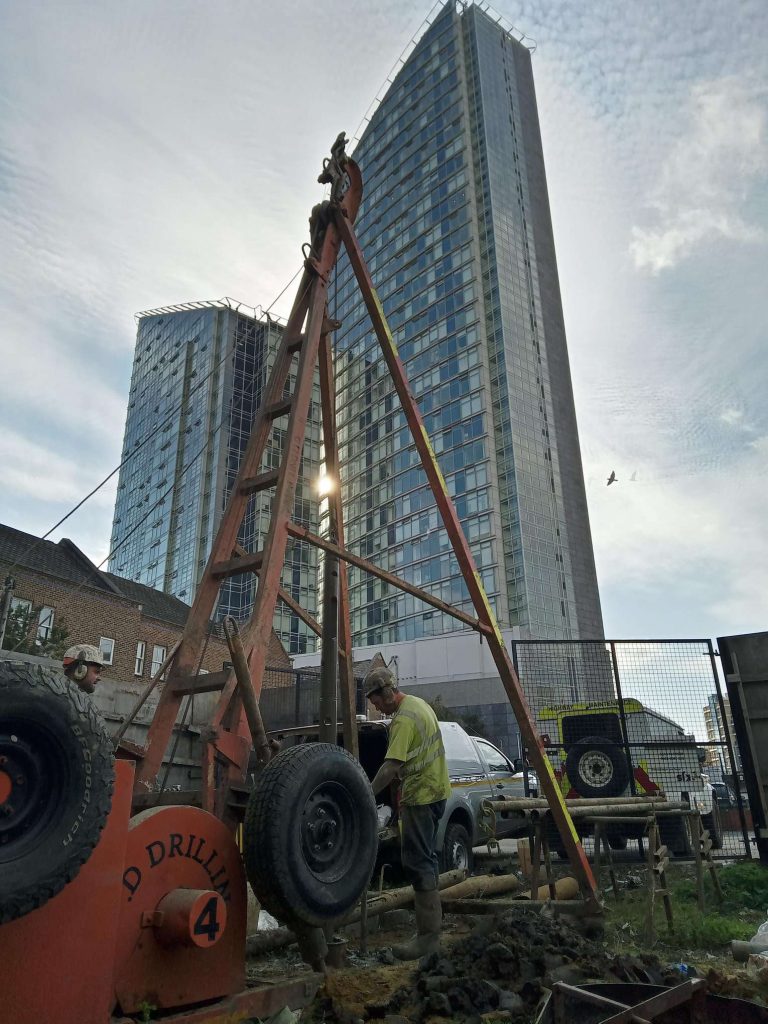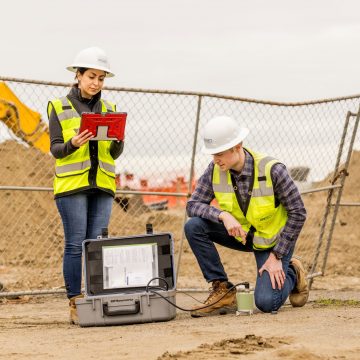The Advancement of Civil Consulting Engineers in the Modern Generation
The Advancement of Civil Consulting Engineers in the Modern Generation
Blog Article
Understanding the Comprehensive Role of Geotechnical Engineers in Ground Investigation and Soil Evaluation for Construction Projects
Geotechnical engineers are integral to the success of construction projects, giving crucial insights through thorough ground examinations and soil analysis. Their know-how in examining soil actions and employing innovative screening strategies educates crucial decisions that promote architectural honesty and security.
Duty of Geotechnical Engineers
The critical role of geotechnical engineers in building tasks can not be overemphasized, as they provide vital insights into soil actions and site problems. These professionals are tasked with evaluating the suitability of the ground for different kinds of structures, guaranteeing security and security throughout the construction procedure. Their expertise incorporates a vast variety of tasks, consisting of site characterization, dirt sampling, and laboratory testing, which are crucial for figuring out the physical and mechanical homes of the dirt.
Geotechnical designers utilize their searchings for to develop fundamental styles that suit load-bearing demands and reduce dangers connected to dirt settlement, incline, and liquefaction security. They play a crucial duty in recognizing prospective threats, such as groundwater changes and contamination, which can considerably influence job stability. They team up with designers, civil designers, and contractors to ensure that geotechnical considerations are integrated into the general style and construction stages.
Ground Investigation Techniques
Ground investigation techniques develop the foundation of geotechnical engineering, making it possible for designers to get a detailed understanding of subsurface problems. These techniques are crucial for assessing soil properties, identifying groundwater levels, and determining prospective geological dangers.
Usual approaches consist of borehole drilling, which permits the removal of dirt samples at numerous depths, providing essential data for analysis. In addition, sitting screening methods, such as Common Infiltration Tests (SPT) and Cone Penetration Tests (CPT), are employed to assess soil stamina and density straight in the ground.
Geophysical techniques also play a significant duty in ground investigations. Techniques such as seismic studies and electric resistivity tomography assistance evaluate subsurface characteristics without comprehensive excavation. geotechnical eng. These non-invasive methods are especially valuable in big or sensitive locations where disturbance must be decreased
In addition, exploratory trenches can be excavated to visually inspect dirt layers and recognize any abnormalities. Each of these techniques adds one-of-a-kind insights, allowing geotechnical engineers to create precise website analyses and inform layout decisions. In summary, a mix of these ground examination methods is crucial for effective construction jobs, making sure security and structural honesty.
Dirt Analysis Techniques
Soil analysis techniques are crucial for comprehending the physical and chemical residential or commercial properties of soil, which straight affect the layout and building of structures and various other structures. Various techniques are used to analyze soil qualities, making sure that geotechnical designers get accurate information for informed decision-making.
One typically made use of method is grain size analysis, which determines the distribution of bit dimensions within a dirt example. This is vital for categorizing soil types and predicting their habits under tons. One more vital method is Atterberg limits testing, which reviews the plasticity and dampness content of fine-grained soils, giving understandings into their engineering buildings.

Field tests, such as Standard Infiltration Examinations (SPT) and Cone Infiltration Tests (CPT), offer important in-situ data pertaining to soil strength and stratification. Collectively, these soil analysis methods develop the foundation of geotechnical investigation, permitting designers to create efficient and safe frameworks customized to the details problems of the site.
Danger Reduction Strategies
Applying effective risk mitigation techniques is crucial for geotechnical engineers to address possible difficulties in building projects. These methods are critical in determining, assessing, and managing dangers related to dirt problems, website security, and groundwater variations, which can adversely influence task results.
One main approach includes performing thorough website investigations that use advanced geophysical techniques and extensive dirt tasting. By acquiring accurate data on subsurface conditions, designers can make click to find out more enlightened decisions on layout and building methods. Additionally, using anticipating modeling devices permits the simulation of different circumstances, enabling engineers to visualize prospective troubles and apply preventative actions.
Additionally, establishing clear communication channels amongst task stakeholders fosters a joint method to take the chance of management. Normal updates and assessments make certain that all events are conscious of the progressing website problems and can adapt their techniques as necessary.

Impact on Building Projects
The efficiency of danger mitigation approaches straight influences the overall success of construction tasks. Geotechnical designers play a crucial here role in this domain name, as their proficiency in ground examination and soil analysis notifies important decisions throughout the building procedure. By accurately assessing soil problems and determining possible dangers, these specialists make it possible for job teams to develop efficient options that lower risks connected with ground instability, water infiltration, and other geotechnical obstacles.
The impact of comprehensive geotechnical analysis appears in different elements of construction tasks, consisting of cost administration, task timelines, and structural stability. Early recognition of concerns enables for helpful hints prompt treatments, lessening costly delays and budget overruns. In addition, a thorough understanding of website problems improves the layout and design process, making certain that structures are built to hold up against ecological stress and possible all-natural calamities.
Eventually, the payments of geotechnical engineers are essential to the successful implementation of construction jobs. Their work not only promotes security and conformity with guidelines however likewise boosts the lasting sustainability of structures, ensuring that they do effectively throughout their designated life-span. The partnership in between other stakeholders and geotechnical teams is vital for accomplishing ideal end results in construction undertakings.
Conclusion
To conclude, geotechnical engineers do a critical feature in construction jobs with comprehensive ground investigations and soil evaluations. Their knowledge in analyzing dirt behavior, employing different investigation techniques, and carrying out danger mitigation methods substantially adds to the structural stability and security of developed settings. By teaming up with multidisciplinary groups, these experts improve job efficiency and make certain compliance with safety standards, inevitably bring about successful building and construction results and decreased prospective risks.
Geotechnical engineers are important to the success of construction projects, supplying necessary understandings with comprehensive ground examinations and soil evaluation.The crucial function of geotechnical designers in building and construction jobs can not be overstated, as they give essential understandings right into soil habits and website conditions. Their experience incorporates a broad variety of activities, consisting of website characterization, dirt sampling, and lab screening, which are important for establishing the mechanical and physical residential or commercial properties of the soil.
By precisely assessing dirt conditions and determining potential hazards, these professionals allow job teams to create efficient remedies that minimize risks connected with ground instability, water infiltration, and various other geotechnical challenges.
In conclusion, geotechnical engineers perform an essential feature in building tasks through extensive ground investigations and soil analyses.
Report this page